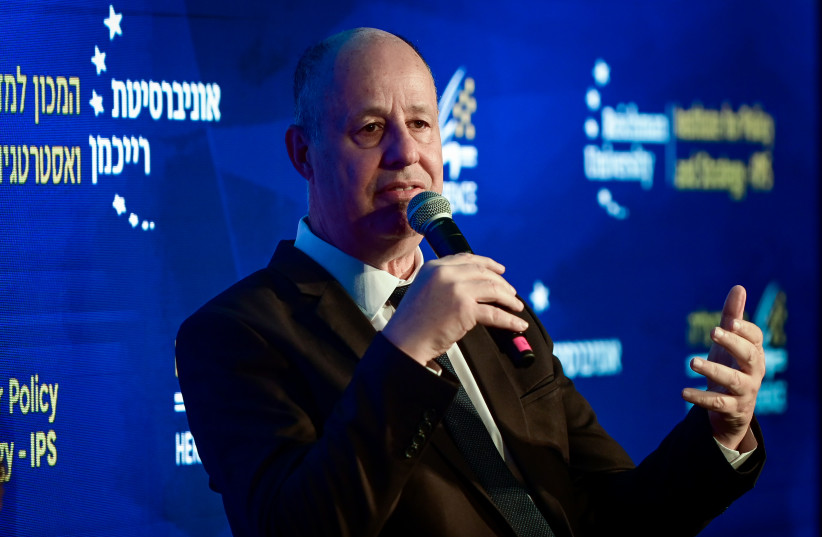The Palestinian Authority has held talks with Israel, Saudi Arabia, and the United States in advance of the pending deal between Riyadh and Washington, National Security Adviser Tzachi Hanegbi said on Monday.
“I believe they [the Palestinians] are very active, they are talking with the Americans, they are talking with us, they are talking with the Saudis, on what would be the significant Palestinian component” of the agreement, Hanegbi told the World Summit on Counter-Terrorism in Herzliya.
“We are in favor of a significant Palestinian component, under the clear restrictions put forward by the prime minister, that we can’t accept any process that would harm Israel’s security,” Hanegbi said.
“But we are prepared to discuss and consider anything else,” he added.
“It is important that the Palestinians are part of the process,” Hanegbi said as he referenced the deal with Riyadh, which would include a normalization deal with Israel and gestures to the Palestinians.

“This Saudi deal requires a dialogue with the Palestinians,” Hanegbi said, explaining that he has been doing this on behalf of Prime Minister Benjamin Netanyahu for eight months through the Forum of Five. This forum includes representatives from Israel, the PA, the US, Jordan, and Egypt.
There has been an attempt through this Forum of Five to arrive at security understandings, Hanegbi said, adding that this is the first dialogue of this kind in a decade.
“I have talked at length to the Palestinians, and it has borne fruit,” he said, particularly with respect to the pending Saudi deal.
Advancing agreements
“We asked for the first time since Camp David in 1978” that the Palestinians do not allow this chance to slip through their fingers and that they contribute to the success of the process and benefit from it, Hanegbi said.
Hanegbi recalled that the possibility of a Saudi-Israel normalization deal had begun in earnest in May.
His US counterpart, Jake Sullivan, Hanegbi recalled, informed him in May that US President Joe Biden had entered into a dialogue with Saudi Arabia to advance an agreement between Riyadh and Washington that would include a normalization deal for Israel.
From the start, this has been characterized by the US itself as a “long shot,” or something with only a 50-50% chance of success, he said.
Despite this, he said, the situation has advanced, because all sides recognize the “win-win” nature of the situation, Hanegbi added.
He pointed specifically to Biden’s announcement at the G20 on Saturday of a new energy and electricity corridor between India, the Middle East, and Europe, which would include both Israel and Saudi Arabia. Israel would be a critical junction of such a project.
“It’s clear that the vision is being turned into reality,” Hanegbi said, as he described how Israel’s rail system would be linked to both Jordan and Saudi Arabia.
It’s significant, Hanegbi said, that as part of the India, Middle East, and Europe economic project, Saudi Crown Prince Mohammed bin Salman would sign a document that references Israel and explains that Israel would play a central role in that new corridor.
It’s still not clear, he said, if the full Washington-Riyadh project will come to fruition, particularly given that it would need the approval of 67 out of 100 US senators.
Hanegbi also hinted at the possibility that the PA could be asked to withdraw its pursuit against Israel at the International Criminal Court as part of the Saudi deal. The ICC is now weighing the possibility of allowing Israelis to be sued for war crimes.
“We are warning the Palestinians, we can no longer tolerate the PA campaign to bring IDF soldiers to [an international] court,” he said.
Such a step “is against all the agreements between us,” he said. The point of the PA’s ICC campaign is to prevent Israel from defending itself against terror, and not punish the soldiers, he explained.
“The moment an ICC [guilty] verdict is reached, we will cut off all diplomatic and security ties with the PA,” Hanegbi said, as he hinted that this would mean that Israel would stop protecting Fatah from Hamas or other terror groups in the West Bank.
The PA’s fate would then be akin to what happened in Gaza during the 2007 coup, when Hamas forcibly ousted Fatah from the Strip, Hanegbi said.
“We told them they will endanger their very existence,” he continued.
Those same soldiers who protect the PA from Hamas and Palestinian Islamic Jihad in the West Bank, can’t at the same time find themselves in danger of arrest when they visit Europe, he said.
As of now, the PA has not changed its stance on this issue, Hanegbi said, but he hoped that as the process toward a Saudi deal advances, progress could occur and that the process of Israeli-Palestinian talks could be re-energized.
